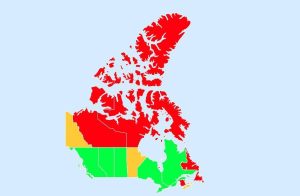IMPORTANT UPDATE: click here for the latest on this topic
If your airline cancels your flight, it’s very important to know that you are legally entitled to a full refund, not just a travel credit for future use. Airlines will definitely try to get away with giving you just a credit or voucher. And while it’s quite understandable, you should be allowed to choose what you prefer.
By the way, this is exactly why you should absolutely not cancel a future trip now. I already mentioned this in our 4 reasons why you should wait before canceling future trips. Still, I want to explain in more detail because we’re getting many reports of people accepting a travel credit instead of a full refund.
It’s very straightforward: if your flight is canceled, you are legally entitled to a refund back to your card, not just an airline credit or voucher.
Here’s how to get it (and why they’re trying not to give it to you—it’s understandable, yet sad, but not in the way you might be thinking).
Which Situation We’re Talking About
This is a complex topic, so bear with me as I make sure we’re all on the same page—so you can make an informed choice and maximize the money you get back.
First, in general, there are two ways to get a refund for any flight:
- get a reimbursement from your credit card insurance
- get a refund or travel credit from your airline
In this post, we’re talking about the airline side, not the credit card insurance. We’ve been telling you for years; you should obviously always pay for any flight with a good travel credit card to get free insurance—it’s vital.
But the insurance will also ask you to try with your airline first anyway (although at least if that doesn’t work, you can use your trip interruption insurance or trip cancelation insurance to get your money back, as we explained Sunday).
Then, with airlines, there are two types of refunds:
- a full refund to your original form of payment
- a travel credit or voucher for future use
In this post, we will help you get the best of the two: the full refund. You probably know the saying “cash is king”: it’s a lot more flexible to have cash rather than a restrictive travel credit (that also expires).
Once you’re ready to rebook a trip after this is over, the odds of that specific airline having the lowest price for your specific dates and destination are slim to nill. That’s normal; flight prices vary so much. That’s why we tell you always to use a flight comparison search tool.
So using a travel credit will “cost” you compared to booking the cheapest airline and cheapest booking website, which is what we always recommend if you care about traveling more (which we hope you do).
Not to mention that you should be earning interest on that cash while you wait to rebook, and not provide an interest-free loan to a multi-billion corporation at your own personal expense. Or you should be able to use that money for other expenses if your income has been affected by the crisis—being a travel website, we know the feeling.
In fact, nearly 1 million Canadians applied for unemployment insurance last week. Many of them might need the money from the refund that airlines owe them a lot more than they need a travel credit. Maybe the amount is not that big, but for some, it could be a lot! Everyone is in a different situation, and everyone should be able to get what the refund they are entitled to, if they want it.
Speaking of sad situations, there’s one last (and very important) reason to avoid travel credits that I’ll share in the last section, but let’s now move to the last clarification element about getting a refund.
Finally, and most importantly, let’s be clear about the two very different situations:
- getting a refund for a flight that your airline canceled
- getting a refund for a flight that you no longer want to fly
In this post, we are talking specifically about flights that have been canceled by the airline. This is an important distinction. If you no longer want to fly, to their credit, airlines are offering generous, flexible change policies and giving you travel credits or vouchers—even though they arguably didn’t have to (see the last section).
Please sign up for free to get our master list of airline change policies that will be published Saturday. That will help you navigate getting refunds or credits for future trips and especially those for which your flights have not been canceled.
But even if they are offering travel credits or vouchers: wait as long as you can before canceling your flight because maybe the airline will cancel your flight in the meantime. Sadly, this will be the case for most upcoming flights.
Then you’ll be entitled to a refund in cash instead of a travel credit.
Okay, the rules below might even possibly apply if they don’t cancel the flight, because of the fact a government advisory was issued. But it’s not as much of a slam dunk legally as if they cancel your flight. See below for details.
How To Get A Refund If Your Flight Is Cancelled
So let’s say your airline cancels your flight. Very likely, given the horrible situation they are in now.
Once your flight is in the next 3 days, now you can undertake the cancelation process (do NOT do it before to help those stuck abroad—this will no longer be required as time goes by, but for now, call centers are still overwhelmed so please don’t be selfish).
Try Twitter first if you’re like me and don’t want to speak with a human (I did it this weekend for my flight to Sri Lanka that was scheduled for yesterday; I’ll share that experience in a post soon). Or call.
The airline might offer a refund right away if it’s one of the nice ones.
But it’s much more likely that they will try to get away with offering you a travel credit (or voucher) to use in the future (12 months or 24 months).
Do not accept it. Once you’ve accepted it, it’s harder to undo.
Many will settle for that first offer, thinking they don’t have much of a choice (and that’s what the airline will tell you, of course).
It’s the path of least resistance, and it’s human nature to take the most convenient and most simple option: airlines are counting on that.
It’s just like rewards programs that do everything they can so you use their points badly, for anything other than travel. It’s much easier and much less costly for them (avoid that at all costs if you’re a traveler).
And other travelers simply don’t know their rights, which is normal; this is very complicated, as I said.
It can also seem hard to fight these huge corporations, which are often perceived to care little about their customers (whether it’s true or not).
Here’s what to do.
Step-by-step to get a refund
First, however you contact the airline, be assertive, but be nice—nobody wants to help someone who’s impolite. And document every part of the process (recordings, screenshots, etc.).
Insist on the fact that you purchased a service that will not be rendered as contractually-agreed. Therefore, you are legally entitled to a complete refund, per Canadian contractual law.
Yes, your flight purchase is a contract. And yes, even if you did not book with the airline directly—you still have a contract with them as the service provider. A contract of carriage exists for each flight, between you and the airline, no matter where you purchased it.
With a flight cancelation, the contract has been modified without your consent, and you are entitled to a complete refund.
Even if the reason for the canceled flight is out of the airline’s control!
Insist on the fact that their own internal policies can not supersede contractual law, and the law entitles you to a refund.
What happens if they don’t budge, as many surely won’t?
Simply inform them that if you don’t get a full refund, you will be initiating a chargeback through your credit card provider, or taking legal action. More on that in a second.
For US airlines, the US DOT (Department of Transportation) requires airlines to offer a refund if a flight is canceled. It’s spelled out very clearly, unlike what we have in Canada (which doesn’t stop them from trying to avoid it, far from it).
European Union airlines, or any airline if one of your flights was departing from the EU, are also easier to deal with since the EU 261 passenger rights regulation is also very explicit.
Canadian airlines are ironically the most likely to deny your refund claim. They will argue that since the situation is out of their control, they don’t have to refund you, which is not quite true. But what applies here is general contractual law, instead of a specific rule like in the EU and US, and that’s why they’re trying to get out of it—knowing that this situation is a little less cut-and-dried will discourage many travelers from pressing on (that and what we explain in the last section).
For other international airlines, as long as your flight was to or from Canada, the same Canadian protection applies, and you still have a contract that is binding in the eyes of Canadian law.
So if they still refuse to give you a refund, do a chargeback. It’s also called disputing the charge.
You call your credit card issuer and say the same thing: the airline unilaterally modified the agreement and will not be providing the service as contractually-agreed, and they refuse to refund you. The credit card will refund you and deal with the merchant.
To be clear, this is not travel insurance coverage at all. Any card provider can do a chargeback; it has nothing to do with insurance. It’s for any situation where you paid for a product and service and did not get it.
That’s why it makes no sense to pay anything (not just flights) with a debit card or cash (that and getting 1%–5% back in rewards with a good travel credit card).
If, for some reason, your credit card issuer won’t do a chargeback (which shouldn’t happen in most cases), then it’s a little more complicated since you’ll need to take legal action. Which might not be worth it to you since it’s a lot more effort; it’s understandable. It all depends on everyone’s situation, as mentioned.
Hopefully, it doesn’t get to that, but you’d still likely win. The only problem is if airlines get the government to step in and relieve them of having to honor their obligation because the coronavirus is a force majeure.
Which unfortunately isn’t impossible given the government’s track record of failing to protect consumers: we only need to look back a few months with the borderline-insulting Canadian Bill of Passenger Rights, which almost made the situation better for airlines than it was without a bill, which is quite the accomplishment.
So it might come down to class action lawsuits (there are already rumblings of this being organized). We’ll let you know if it comes to that, and we’ll try to find a specialized lawyer to interview to give you more details (sign up for free to get updates).
In short, legally, you are owed a refund as of now if the airline canceled your flight.
Now for flights that were not canceled, but that you want to cancel yourself due to the pandemic. You can definitely try to argue that the travel advisory issued by the government could be legally seen as an unforeseeable circumstance that interferes with the contract and voids it and entitles you to a refund, maybe it will work.
As I said above, in the case of flights not canceled by the airline, it’s less of a slam dunk, but that legal basis I just shared is worth a shot. And then you can also try a chargeback if they refuse or take legal action.
Why Airlines Don’t Want To Give You A Refund
Finally, a side note about the highly unusual coronavirus situation.
Let’s be clear. Airlines around the world are in a dire situation. Many will fail in the coming months; it’s not a matter of if, but rather a matter of when (and which ones). The industry has been decimated by the coronavirus pandemic.
Aviation is a hard business, even in the best of times. And these are by far the worst times they’ve ever seen.
That’s the very sad part.
So the former management consultant in me completely understands their position and why they are trying to solve their liquidity issues.
I genuinely get it. I doubt they enjoy circumventing their own contracts of carriage, but they are literally fighting to survive and maintain cash flow. That said, it doesn’t make it okay to deny you your rights.
Airlines going out of business is obviously very bad for their front-line employees, but it’s also bad for all us travelers. It’s definitely not something to be happy about.
The incredible level of competition in the past few years has made flying literally the cheapest it has ever been in history. That’s very good if you want to travel more. So less competition because of airlines collapsing will hurt us all.
And while I love airlines and the aviation industry, here at Flytrippers, we will always defend travelers and advocate for what allows travelers to travel more.
And it’s undeniable that getting a full refund is better for travelers than a credit, as explained above. So that you have the option of doing what you want with your money based on your situation. So you can get your money now and accrue interest or use the amount for your next trip with the cheapest airline and booking site, not with the airline that was the cheapest last time.
Not to mention that, unfortunately, since some airlines will fail, getting a travel credit is risky (this is the other major reason to avoid them that I teased earlier). This is completely unprecedented; nearly all flights are canceled. Nothing can be ruled out.
What happens to your credit if the airline no longer exists? It’s gone. If you got it back, you’re good. If the purchase is still on your card, you should also be able to do a chargeback. But a travel credit with a non-existent airline is useless.
Airlines are possibly even counting on the fact that if enough consumers have travel credits, the public will be more favorable to taxpayer funds being used to keep them afloat. They will ask governments for bailouts, but that’s a whole other topic for another day (sign up for free for all our content).
My personal take is a realistic one: given how severe this is, airlines will likely get taxpayer funds anyway, whether or not they keep travelers’ refund money. So we might as well not let them keep what’s ours, to avoid paying twice.
Or at least give travelers the choice: those who want to let the airlines keep it can do so, while those who want their money back can get it. You can’t claim to defend consumers if you don’t defend the consumer’s right to choose!
And while it’s definitely true that keeping passengers’ money would help airlines get through the crisis, would it even be enough? And more importantly, does that mean that legal principles, and the fact that that money is yours, should just be brushed aside?
Look, I know people love to hate airlines. But as an experienced flier and aviation industry expert, the fact is while some complaints are legitimate, many are unfounded.
But not this one: airlines should refund you if they cancel your flight.
To the airlines’ credit, they have offered very flexible policies for flights in March and April. We have to commend them for that because they arguably didn’t have to offer free changes and credits. They’re not in the insurance business. But they did the right thing and made it easy, and that has to count for something.
But it doesn’t mean you should renounce your refund if they canceled your flight if you want it. You are entitled to it.
Want to get all our content for Canadian travelers?
Summary
Airlines will try to offer a travel credit instead of a full refund if they cancel your flight. This is understandable given their position, and given a sizeable portion of travelers will simply accept that no questions asked. But legally, you are entitled to a full refund, and if you follow these steps, you should be able to get it if you’re willing to stand your ground.




